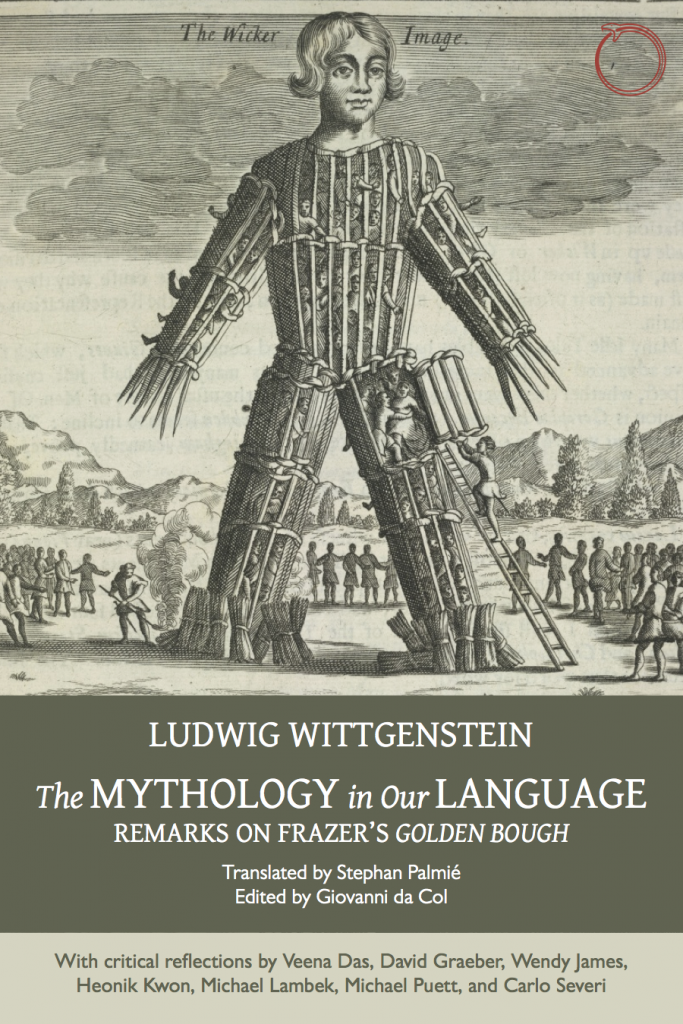Remarks on Frazer’s Golden Bough
by Ludwig Wittgenstein
Translated by Stephan Palmié
Edited by Giovanni da Col and Stephan Palmié
With critical reflections by Veena Das, Wendy James, Heonik Kwon, Michael Lambek, Sandra Laugier, Knut Christian Myhre, Rodney Needham, Michael Puett, Carlo Severi, and Michael Taussig
In 1931, Ludwig Wittgenstein wrote his famous Remarks on Frazer’s Golden Bough, published posthumously in 1967. At that time, anthropology and philosophy were in close contact—continental thinkers drew heavily on anthropology’s theoretical terms, like mana, taboo, and potlatch, to help them explore the limits of human belief and imagination. Now the book receives its first translation by an anthropologist, in the hope that it can kick-start a new era of interdisciplinary fertilization.
Wittgenstein’s remarks on ritual, magic, religion, belief, ceremony, and Frazer’s own logical presuppositions are as lucid and thought-provoking now as they were in Wittgenstein’s day. Anthropologists find themselves asking many of the same questions as Wittgenstein—and in a reflection of that, this volume is fleshed out with a series of engagements with Wittgenstein’s ideas by some of the world’s leading anthropologists, including Veena Das, Wendy James, Heonik Kwon, Michael Lambek, Sandra Laugier, Knut Christian Myhre, Rodney Needham, Michael Puett, Carlo Severi, and Michael Taussig.
“This volume is an important intellectual event—in particular, because of the decisions by the editors to showcase some of the most important anthropological perspectives on this text. This will perhaps be taken as a provocation by philosophers, but for me, the strength of this project lies both in its teaching and in its content: after all, many philosophers, including Wittgenstein, have had no problem proclaiming that they are doing anthropology. It is now anthropology’s turn—as an established discipline in its own right—to take on this text and its significance and provocation for it.”
—Sandra Laugier, author of Why We Need Ordinary Language Philosophy
“Palmié’s new translation of Wittgenstein’s Remarks on Frazer’s “Golden Bough”,joined to a set of super-commentaries by anthropological luminaries, is revelatory. This volume restores Wittgenstein’s Remarks to its own lifeworld. In the process, Wittgenstein’s intervention appears again as necessary, and as necessarily unfinished, today as it was in mid-century. An invigorating, dazzling contribution carried out with rare intellectual care.”
—Paul C. Johnson, editor of Comparative Studies in Society and History
“Wittgenstein’s engagement with Frazer’s Golden Bough was one of the most remarkable intellectual encounters of the 20th century. With Frazer, the young discipline of anthropology had staked a claim to hold the secret to answering the question of what it is to be human. Wittgenstein found much in anthropological inquiry that was relevant to his thoughts on language, meaning and understanding, though for that he had to overturn many of Frazer’s fundamental assumptions, out-anthropologising, one might say, the anthropologist This series of commentaries brilliantly demonstrates how crucial the issues raised in this exchange remain.”
—Geoffrey E. R. Lloyd, author of The Ambivalences of Rationality: Ancient and Modern Cross-Cultural Explorations
Ludwig Wittgenstein (1889-1951) was arguably the most influential philosopher of the twentieth century. He was born in Vienna, but studied and practiced philosophy in Great Britain. He was a professor of philosophy at the University of Cambridge from 1939 until 1947. He worked in—and transformed—the fields of logic, the philosophy of mathematics, the philosophy of mind, and the philosophy of language.
Stephan Palmié is the Norman and Edna Freehling Professor of Anthropology at the University of Chicago and the author of Wizards and Scientists: Explorations in Afro-Cuban Modernity and Tradition and The Cooking of History: How Not to Study Afro-Cuban Religion.
© HAU Books 2018 | Published in 2020
ISBN: 9780990505068 [paperback]
eISBN: 9781912808403 [ebook and PDF]
6″ x 9″, 320 pp.
$35
Stephan Palmié
Ludwig Wittgenstein, translated by Stephan Palmié
Carlo Severi
Heonik Kwon
Knut Christian Myhre
Wendy James
Michael Puett
Veena Das
Michael Lambek
Michael Taussig
Sandra Laugier, translated by Daniela Ginsburg
Rodney Needham
